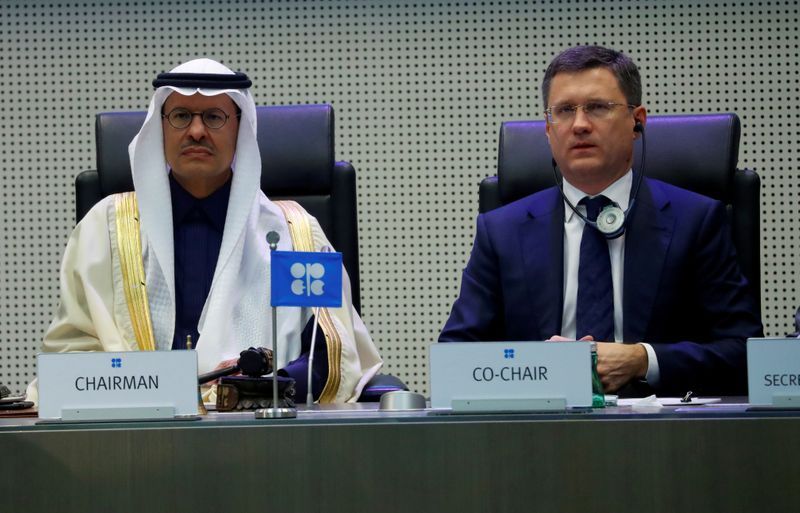By Rania El Gamal, Vladimir Soldatkin and Alex Lawler
DUBAI/MOSCOW (Reuters) - OPEC and Russia have postponed a Monday meeting to discuss oil output cuts until April 9, OPEC sources said on Saturday, as a dispute between Moscow and Saudi Arabia over who is to blame for plunging crude prices intensified.
The delay came amid pressure from U.S. President Donald Trump for the Organization of the Petroleum Exporting Countries led by Saudi Arabia and its allies, a group collectively known as OPEC+, to urgently stabilise global oil markets.
Oil prices hit an 18-year low on March 30 due to a slump in demand caused by lockdowns to contain the coronavirus outbreak and the failure of OPEC and other producers led by Russia to extend a deal on output curbs that expired on March 31.
OPEC+ is working on a deal to cut the production of oil equivalent by about 10% of world supply, or 10 million barrels per day, in what member states expect to be an unprecedented global effort including the United States.
Washington, however, has yet to make a commitment to join the effort and Russian President Vladimir Putin on Friday put the blame for the collapse in prices on Saudi Arabia - prompting a firm response from Riyadh on Saturday.
"The Russian Minister of Energy was the first to declare to the media that all the participating countries are absolved of their commitments starting from the first of April, leading to the decision that the countries have taken to raise their production," Saudi Energy Minister Prince Abdulaziz bin Salman said in a statement reported by state news agency SPA.
Putin, speaking on Friday during a video conference with government officials and the heads of major Russian oil producers, said the first reason for the fall in prices was the impact of the coronavirus on demand.
"The second reason behind the collapse of prices is the withdrawal of our partners from Saudi Arabia from the OPEC+ deal, their production increase and information, which came out at the same time, about the readiness of our partners to even provide a discount for oil," Putin said.
The Saudi foreign minister disputed Putin's claims, saying Russia had withdrawn and that statements about the kingdom's withdrawal from the OPEC+ deal was devoid of truth, state agency (SPA) reported.
Foreign Minister Prince Faisal bin Farhan Al Saud added that the kingdom's stance on shale oil production is known and that it is an important part of energy sources, SPA said.
OPEC sources, who asked not be identified, said the emergency virtual meeting planned for Monday would likely now be postponed until April 9 to allow more time for negotiations.
OPEC sources later downplayed the Saudi-Russia row, saying the atmosphere was still positive, although there was no draft deal yet nor agreement on details such as a reference level from which to make the production cuts.
"The first problem is that we have to cut from the current production level now, not to go back to the one before the crisis," one of the OPEC sources said. "The second issue is the Americans, they have to play a part."
OIL RISES FROM LOWS
Oil recovered from this week's lows of $20 per barrel with Brent settling at $34.11 on Friday, still far below the $66 level at the end of 2019. Prices had their biggest one-day gain ever on Thursday when Trump said he expected Russia and Saudi Arabia to announce a major production cut.
The United States is not part of OPEC+ and the idea of Washington curbing production has long been seen as impossible, not least because of U.S. antitrust laws.
Still, the oil price crash has spurred regulators in Texas, the heart of U.S. oil production, to consider regulating output for the first time in nearly 50 years.
But U.S. Energy Secretary Dan Brouillette, in a call with oil industry leaders on Friday, did not mention the possibility of U.S. production cuts, a source who listened to the call said.
Russian Energy Minister Alexander Novak told Russian state media he understood that the United States had legal restrictions on output cuts but it should still be flexible.
Other oil producers that do not belong to OPEC+ have indicated a willingness to help. Canada's Alberta province, home to the world's third-largest oil reserves, is open to joining any potential global pact.
Norway, Western Europe's largest oil and gas producer, said on Saturday it would consider cuts to its oil output if a wide global deal is agreed.
The International Energy Agency warned on Friday that a cut of 10 million bpd would not be enough to counter the huge fall in oil demand. Even with such a cut, inventories would increase by 15 million bpd in the second quarter.

Asked if he was considering tariffs on Saudi oil, Trump said late on Friday: "Tariffs are a way of evening the score ... Am I doing it now? No. Am I thinking about imposing it as of this moment? No. But if we're not treated fairly it's certainly a tool in the toolbox."